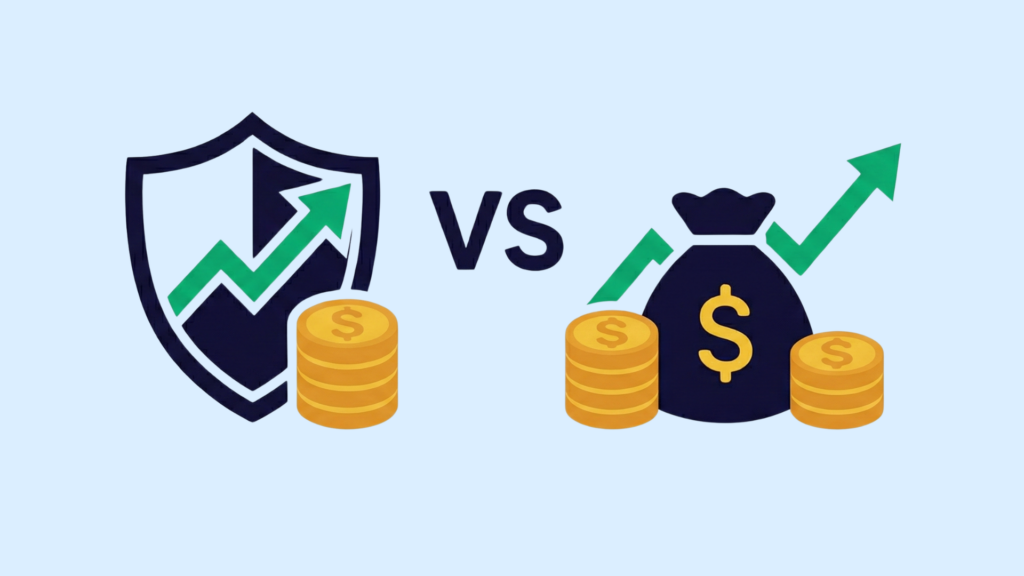Fixed income mutual funds are schemes that invest primarily in debt instruments like corporate bonds, government securities, treasury bills, and money market assets. These funds try to deliver stable and predictable returns by generating interest income while also keeping capital risk relatively low.
They are actively managed and are suitable if you’re looking for income consistency, lower volatility, and portfolio diversification. In this blog, we’ll cover how fixed income mutual funds work, key benefits, and how to choose the best fixed income mutual fund based on your goals. Read along!
How Do Fixed Income Mutual Funds Work?
Fixed-income mutual funds provide stable returns by putting your money through two key sources:
- Interest income earned on the underlying debt holdings.
- Capital preservation, as most instruments are held until maturity.
The fund’s Net Asset Value (NAV) fluctuates based on market factors. Two key risks influence NAV:
- Interest rate risk: When market interest rates rise, the price of existing bonds falls, and vice versa. This impacts the fund’s NAV.
- Credit risk: The risk that issuers might default on payments
Fund managers play a central role in selecting high-quality instruments and maintaining the right mix of risk and return. Some fixed mutual funds, like Fixed Maturity Plans (FMPs), are close-ended and can only be purchased during the New Fund Offer (NFO) period, locking in your investment for a fixed term.
Benefits of Fixed Income Mutual Funds
Fixed-income mutual funds offer several advantages for investors seeking relatively stable returns with lower risk compared to equities. The benefits of fixed income mutual funds include:
Predictable Income
Fixed income mutual funds generate regular income via interest earned on debt instruments. The income is more stable and consistent than equity funds even though the returns are not guaranteed. This makes them best for investors who need consistent cash flow, like retirees or people planning short-term goals.
Lower Volatility than Equities
Compared to equity mutual funds, fixed mutual funds typically experience less price fluctuation. They do not depend on stock market performance and the returns they generate are influenced more by interest rates and credit risk. This makes them a more stable option when the market is uncertain.
Liquidity Advantage
Most fixed income mutual funds give you easy access to your money. You can redeem your units at any time but it is subject to exit load (if applicable). This provides better flexibility than traditional fixed-income products like fixed deposits or bonds with lock-in periods.
Diversification Potential
Adding fixed return mutual funds to your portfolio helps spread your risk in various asset classes. They act as a counterbalance to equity investments especially during market downturns. This boosts the risk-return profile of your portfolio, particularly if you’re looking for stability without compromising on access or transparency.
Types of Fixed Income Mutual Funds
Fixed income mutual funds come in different categories depending on the type of debt instruments they invest in and the time duration of those investments. Choosing the right type is dependent on your cash flow needs, risk appetite and how long you plan to stay invested.
Below are some of the commonly available options:
- Liquid Funds: Liquid funds invest in short-term money market instruments with maturity dates of up to 91 days. They are often used for parking surplus cash for very short periods and are considered one of the lowest-risk fixed-income mutual fund options.
- Ultra-Short Duration Funds: These funds invest in instruments with a maturity date of 3 to 6 months. Ultra-short duration funds are suitable if you’re looking for slightly better returns than liquid funds without taking on much additional risk.
- Corporate Bond Funds: Corporate bond funds allocate a minimum of 80% of their assets to high-rated (AA+ and above) corporate debt. While the credit risk is low due to the quality of bonds, returns are still market-linked and may vary based on interest rate movements.
- Gilt Funds: Gilt funds put money exclusively in government securities of varying maturities. These funds carry no credit risk since the borrower is the government, but they do carry interest rate risk. Gilt funds can be a good option if you’re a conservative investor with a medium to long-term horizon.
- Fixed Maturity Plans (FMPs): FMPs are closed-ended funds with a fixed investment period, usually several months to a few years. They invest in debt instruments that mature around the same time as the fund and offer more predictable returns if held till maturity. However, you can only invest during the fund’s launch period and are not allowed to exit early.
Fixed Income vs Fixed Return Mutual Funds
Many investors assume that fixed income mutual funds offer guaranteed returns, similar to fixed deposits. However, that is not the case.
Here’s a simple table to help you understand how fixed income mutual funds differ from other schemes:
| Aspect | Fixed Income Mutual Funds | Fixed Return or Guaranteed Schemes |
| Type of Investment | Invest in debt instruments like government bonds, corporate debentures, etc. | Usually offered by insurers, NBFCs, or banks as structured products |
| Return Nature | Market-linked; returns fluctuate based on interest rate movements and credit risk | Fixed returns promised upfront, often contractual |
| Capital Safety | Not guaranteed; subject to credit and interest rate risk | Capital is typically guaranteed, depending on the issuer |
| Regulation | Regulated by SEBI under mutual fund guidelines | Regulated by IRDAI (for insurance), RBI or SEBI (depending on type) |
| Transparency | High; all schemes must disclose portfolio details, risk factors, and past returns | Moderate; may not disclose underlying investment details clearly |
| SEBI Disclosures | Must include a disclaimer: “Mutual fund investments are subject to market risks” | Disclosures vary by product type and regulator |
| Liquidity | High; you can redeem anytime (subject to exit load, if applicable) | Often have lock-in periods or penalties on early exit |
How to Choose the Best Fixed Income Mutual Funds
Choosing the right fixed income mutual fund is important if you’re considering investing in fixed income mutual funds. A well-chosen fund can give consistent income but the wrong choice can result in unnecessary risk or poor performance.
Here’s how you can make a more informed decision:
Fund Objective and Duration Match
Check if the fund’s objective and duration match your needs. Fixed return mutual funds come in various categories like short-duration, medium-duration, or dynamic bond funds.
If you plan to invest for less than three years, for example, a short-duration or low-duration fund may be better. For a longer horizon, you can consider medium or long-duration funds.
But make sure that you align your investment timeframe with the fund’s maturity profile to manage interest rate risk effectively.
Credit Rating of Instruments
Look at the credit quality of the instruments the fund invests in. This shows the financial strength of the borrowers issuing those bonds. A fund holding mostly AAA-rated instruments is lower in risk, while a credit risk fund invests in lower-rated bonds that may offer higher returns but also carry a greater chance of default.
If you’re risk-averse, avoid funds with high exposure to lower-rated instruments, even if the returns look attractive on paper.
Expense Ratio
The Mutual Fund expense ratio—the yearly fee charged by the fund house—is another important factor. Since fixed mutual funds often generate moderate returns, high fees can eat into your earnings over time. Compare funds within the same category and prefer those with a lower expense ratio, provided other parameters are sound.
Performance Consistency
You should also assess the fund’s consistency in performance. Don’t just look at the latest returns; but also focus on how the fund has performed across different interest rate cycles.
A good approach is to review 3-year and 5-year annualised returns, and compare them with the average returns in the same category. This helps you identify whether the fund has managed volatility well.
Fund Manager Profile
Lastly, check who is managing the fund. A fixed-income mutual fund is only as good as its fund manager’s ability to manage credit and interest rate risks. Look for managers with a track record of managing similar funds through different market cycles. A stable fund management team, usually, brings better consistency and strategy execution.
Who Should Invest in Fixed Income Mutual Funds?
Fixed-income mutual funds are best if you want stable returns with moderate to low risk. These mutual funds, unlike equity funds, invest primarily in debt instruments and generate predictable income.
Here’s a detailed look at who should consider these funds and why:
1. Retired Individuals Seeking Regular Income
If you’re retired or nearing retirement, regular income mutual funds can help you maintain cash flow without exposing your capital to high market volatility. These funds offer options like Systematic Withdrawal Plans (SWPs) and dividend payouts, that can help you receive consistent income while also keeping your investment relatively liquid.
2. Risk-Averse Investors Focused on Capital Preservation
If preserving your capital is more important than chasing high returns, fixed return mutual funds are worth considering. These funds invest in high-quality debt instruments and are managed by experts to limit risk that offers a more stable experience than equity or hybrid funds.
3. Investors Seeking Portfolio Diversification
Diversification across fixed mutual fund categories (like dynamic bond or credit risk funds) helps manage different types of risks — credit, duration, and interest rate.
Fixed-income mutual funds act as a counterbalance to equities during market downturns. These funds also improve the portfolio’s risk-adjusted return, especially during economic uncertainty.
4. Investors Planning Cash Flow Through Laddering
If you need funds at different stages—EMIs, education, or other goals—fixed mutual funds work well in a laddered setup. By putting your money across varying durations, you can better plan your withdrawals and manage reinvestment risks effectively.
Top 5 Best Fixed Income Mutual Funds in India
Based on assets under management and five-year compounded annual growth rate (CAGR), here are the top five fixed income mutual funds in India for 2025:
| Fund Name | Sub-Category | AUM (₹ in Cr) | 5Y CAGR (%) |
| Aditya Birla SL Medium Term Plan | Medium Duration Fund | 1,981.28 | 12.02 |
| Bank of India Credit Risk Fund | Credit Risk Fund | 114.92 | 10.94 |
| JM Low Duration Fund | Low Duration Fund | 231.17 | 9.63 |
| Aditya Birla SL Credit Risk Fund | Credit Risk Fund | 933.02 | 9.21 |
| Baroda BNP Paribas Credit Risk Fund | Credit Risk Fund | 161.79 | 9.02 |
Conclusion
Fixed income mutual funds offer a practical way to earn consistent returns while managing risk. With benefits like lower volatility, predictable income, and high liquidity, they are a strong option for conservative and goal-based investors.
While these funds don’t offer guaranteed returns, they provide a balance of safety and earning potential through careful debt allocation. By understanding your financial goals and investment horizon, you can make informed choices and use fixed income funds effectively in your portfolio.
FAQs
Are fixed-income mutual funds safe for beginners?
Fixed-income mutual funds are generally considered lower risk in contrast to equity funds, which makes them best for beginners seeking stable returns. However, they are not risk-free—interest rate changes and credit risk can affect performance. They’re a good starting point if you want predictable and stable income with moderate risk.
Do fixed-income mutual funds give guaranteed returns?
No, fixed income mutual funds do not offer guaranteed returns. Although they generate consistent income by investing in fixed return instruments, the returns are subject to interest rate movements and credit risk. Unlike fixed deposits, a fixed return mutual fund does not promise assured returns.
Which is the best fixed-income mutual fund in India today?
Some of the best fixed-income mutual fund in India today are:
- Aditya Birla SL Medium Term Plan
- UTI Dynamic Bond Fund
- DSP Credit Risk Fund
- Bank of India Short Term Income Fund
Can I earn a monthly income from regular income mutual funds?
Yes, you can earn a monthly income from regular income mutual funds using options like the Systematic Withdrawal Plan or dividend payouts. An SWP lets you withdraw a fixed amount at regular intervals. Whereas, dividend options distribute income when the fund generates surplus. These make fixed income mutual funds best for those seeking consistent cash flow.
How are fixed-income mutual funds different from FDs?
Fixed income mutual funds are different from fixed deposits in risk, returns, and flexibility. FDs give you guaranteed returns at a fixed interest rate, making them low-risk. Fixed mutual funds invest in market-linked debt instruments and can offer higher returns but also have some risk. Unlike FDs, fixed return mutual funds provide liquidity and tax efficiency under certain conditions.
What are the tax implications of investing in fixed-income mutual funds?
Tax on fixed-income mutual funds is applicable only when you redeem your investment.
- If held for less than 3 years, gains are taxed as Short-Term Capital Gains (STCG) at your income tax slab rate.
- If held for more than 3 years, gains were earlier eligible for Long-Term Capital Gains (LTCG) with indexation, but post-April 2023, all gains are taxed as per your slab, regardless of the holding period.
Disclaimer
The information provided in this article is for educational and informational purposes only. It should not be considered as financial or investment advice. Investing in stocks involves risk, and it is important to conduct your research and consult with a qualified financial advisor before making any investment decisions. The author and publisher are not responsible for any financial losses or gains that may result from the use of this information.























